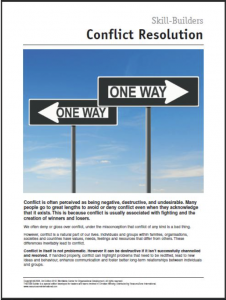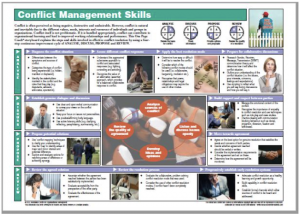Conflict in churches can range between problems with specific people to clashes in philosophy of ministry to division between entire congregations. Some issues will be fairly black and white while many more are complex and nuanced. It is the job of a coach to coach their client through the conflict to the best path forward.
Many churches (but not all) will have clear procedures in place to deal with scandals. Even the best plans go awry. In churches, scandals hit close to home. People you know and love and have invested in are involved. Words are said that cannot be unsaid. News of improprieties spread and grow like wildfire. Emotions rise as high as the stakes. Your client comes to you seeking help to unravel the mess, minimize permanent damage, handle the blowback, and find a peaceful way forward.
This is when you call on your “inner coach” (or the Holy Spirit) to help you remain anchored in Him and share your wisdom through listening and asking questions. A coach does not need to respond to the impulse to give input unless explicitly asked (and only after the client has exhausted all of their resources and are at the end of their tether).
At the same time, you are invested in the life of this leader. You are empathetic. And you are concerned. What can you do and what should you avoid doing as a coach?
7 Strategies to Help Your Client Navigate Scandal

1. Process emotions
Situations like these always come with a range of emotions. And they should. As a coach, you are a safe place to vent and validate feelings. After processing emotions they will be able to look at the situation with greater clarity and objectivity.
Coaching Questions:
- How are you personally affected by this issue?
- Who do you feel you need to protect?
- How has this impacted your relationship(s)?
2. Anchor in Christ
There are moments that may require some shepherding. It’s human nature to take things personally and take control. Come alongside your client and challenge them to see where they are leaning on their own understanding. Urge them to release both the big picture and details back into the hands of the Almighty. Even take a few minutes agreeing with your client in prayer. This will make all the difference!
Coaching Questions
- What are you most worried about?
- Where are you tempted to take control?
- What is the Holy Spirit saying to you?=
3. Gather the facts
When emotions or tensions or stakes are high the temptation is a knee-jerk reaction. It’s important to help your client slow down and gather the facts. It’s essential to look at the issue from multiple angles, or else important perspectives will be overlooked.
Coaching Questions:
- What is the nature of the offense?
- Who is involved?
- What perspectives need to be considered?
- What are the potential threats to deal with?
- How will this impact the church community?
4. Find the truth
When more than one party is involved there are almost always conflicting accounts of the situation. That doesn’t necessarily mean that someone is lying. But there is always an underlying truth that can be addressed.
Coaching Questions:
- Where aren’t the facts lining up?
- What steps can you take to get clarity?
- What truth or biblical principle(s) apply to this situation?
5. Take responsibility
No matter what happened or who is involved, leadership will take some portion of the blame. Sometimes leaders feel like it’s all their fault taking on more blame than they should own. Sometimes people unfairly blame the leader for what was truly outside of their control.
The way to control unfair blaming is to honestly examine what happened from organizational and leadership perspectives and identify the blind spots. When a leader clearly sees how this happened on their watch, they can grow and take action to protect themselves and their community in the future.
Coaching Questions:
- Where are the gaps in this situation??
- In what ways was it your job to protect this from happening?
- What are you learning?
- How can you appropriately take responsibility for your part?
- What needs to be done to protect yourself and your community from this happening in the future?
6. Create a plan
So far, everything we’ve talked about has been some form of reflecting and processing. While this is absolutely necessary to moving forward with wisdom, your client came to you looking for a solution. Don’t end the conversation without a plan for action. Help them determine the main goal and clarify next steps.
Coaching Questions:
- Describe the outcome you want to achieve in this situation.
- What needs to be in place to make that possible?
- What steps need to be taken?
- When will you take those steps?
- Who do you need on your team in order to see this through with care and excellence?
7. Determine Communications
How communications are handled during sensitive situations can be the make-it-or-break-it factor. Clear, transparent, and appropriate communication is among the highest of priorities. Your client needs to understand who needs to know and what needs to be said. Note that in some cases there may be a need for additional outside counsel, mediation, or legal advice.
Coaching Questions
- What factors determine who needs to know what in this situation?
- Considering those factors as a lens…
- Who needs to know everything?
- What needs to remain confidential?
- What needs to be communicated to the congregation?
- How will you handle ongoing communication in this situation?
Coaching Cohorts
Christian Coaching Tools has 2 fantastic opportunities to help you grow as a coach!
Christian Coaching Essentials Cohort
- Are you new to coaching?
- Do you need to refresh your coaching process?
If this is you or someone you know, sign up for the Fall Cohort by September 1st and receive $500 off tuition! Work through the Essentials in a small cohort alongside 2 world-class coaches! LEARN MORE HERE
Christian Coaching Excellence Cohort
- Are you ready to grow your coaching?
- Do you need to refine your coaching skills?
If you have been coaching for a while but aren’t seeing the results you hoped to, it’s time to increase your effectiveness! T Excellence Cohort includes one-on-one coach mentoring and gives you a personalized plan for your development as a coach.
Register before September 1st and receive $500 of your tuition! LEARN MORE HERE
Conflict Resolution Resources


